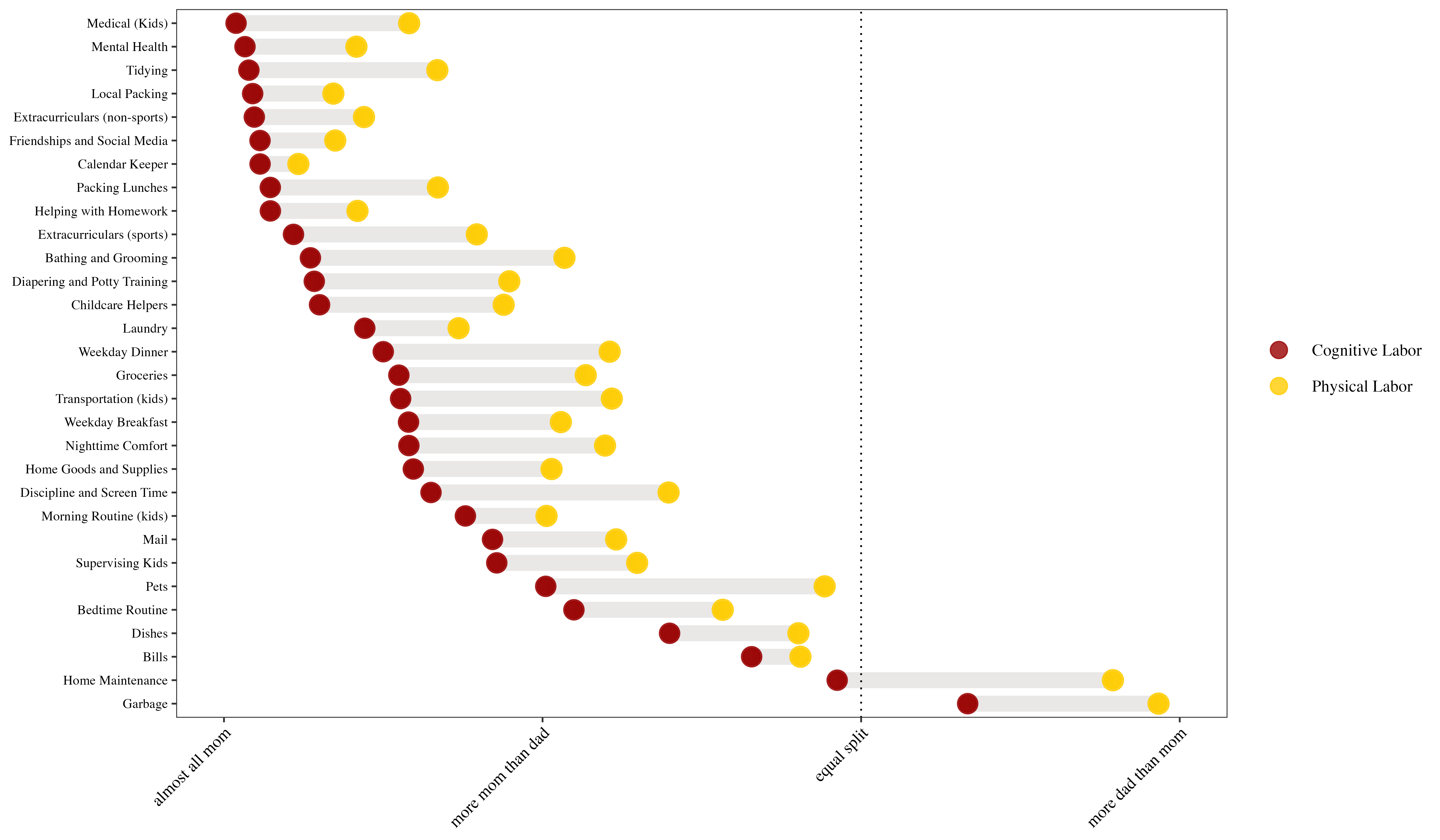The Invisible Workload
How Cognitive Household Labor Impacts Mothers’ Mental Health

When we talk about household chores, we might think of tasks like cooking, cleaning, and laundry. But there’s a lot more hidden under the surface: the effort of planning or coordinating those tasks. Cooking a meal is one task, but before cooking can begin, the cook needs a dinner plan, a clean workspace, and a fridge full of groceries. In a couple or a household, who executes those tasks? And who is responsible for planning, coordinating, or otherwise ensuring those tasks get done?
For most families, it’s Mom. Whether it’s planning meals, scheduling appointments, or keeping track of supplies, a new study led by USC researchers shows that these cognitive tasks often fall disproportionately to women–specifically, mothers. And this often overlooked dynamic carries a heavy toll: the same study shows that an unequal cognitive burden has a significant impact on mothers’ mental health.
What is Cognitive Household Labor?
Cognitive household labor involves the mental work of managing a household and family. It’s the behind-the-scenes effort that keeps everything running smoothly: planning, organizing, anticipating needs, delegating tasks, and following up to make sure they get done. Unlike physical chores, cognitive labor is invisible and often goes unrecognized, despite being just as—if not more—demanding. And unlike physically executing a task, it’s difficult to measure how much time one spends planning or making sure things get done.
The Study
Public Exchange and USC Dornsife College of Letters, Arts and Sciences researchers partnered with the creators of the New York Times Bestselling book and documentary, Fair Play–a system that uses a deck of specialized cards (with each card representing a common household task) to teach couples how to share the domestic workload more mindfully–to explore the relationship between those workloads and mental health. Researchers surveyed 322 mothers of young children to assess the division of both cognitive (“planning”) and physical (“execution”) household labor between those mothers and their partners. They used detailed self-reporting with respect to 30 common household tasks featured among the Fair Play card deck.

Division of domestic labor by household task
The findings were revealing, if not surprising. Mothers performed more overall domestic labor than their partners, but the division of cognitive labor was especially skewed and unequal. That is, among those surveyed, women’s share of cognitive labor was disproportionately higher than it was for physical tasks.
What This Means for Mental Health
The study uncovers troubling associations between cognitive labor and various aspects of mental health. Put simply: Mothers who shouldered more cognitive labor reported higher levels of depression, stress, and burnout. Further, carrying a disproportionate share of overall domestic responsibilities had a negative impact on relationship satisfaction. Interestingly, while the division of physical tasks was linked with relationship quality, it was the cognitive labor that had a more profound impact on psychological wellbeing.
Mothers who shoulder more cognitive labor reported higher levels of depression, stress, and burnout.
Implications for Change
These findings set the stage for future research and highlight the urgent need to include cognitive labor burdens in discussions about gender, equity, and mental health. From a policy standpoint, data and measures related to how people spend their time and how that affects their behavior, economic output, or health should include the mental side of tasks–something that often goes unnoticed. From a social standpoint, encouraging more equitable responsibility for household planning and organizing could help alleviate the disproportionate burden on women and improve relationship satisfaction. And from an innovation standpoint, developing more support systems to assist mothers in managing this invisible load is crucial to their wellbeing.
Moving Forward
This was the first study to quantify cognitive labor and explore its relationship to maternal mental health. By distinguishing between cognitive and physical tasks, it offers a more comprehensive view of household labor dynamics and their consequences. The study’s results underscore the importance of addressing and equalizing the mental load that many women carry, which is crucial to achieve household equity and improve mental health outcomes for mothers.
This study serves as a wake-up call: cognitive household labor matters. It’s time we see it, acknowledge it, and take steps to share it more fairly. And it’s time to rethink how we perceive and measure household labor.
Recognizing the significant impact that cognitive labor burdens have on women’s mental health is a critical step, but it’s only the beginning. We must examine what we–individuals, partners, corporate leaders, policymakers–can do to alleviate these burdens and support those who bear them. The wellbeing of mothers—and the health of families—depends on it.
A comprehensive report of the full study’s findings is set to be released in fall, 2024. Baseline findings from this study were published in Archives of Women’s Mental Health on 7/1/2024. Read the full paper here.
Written by the PX study team

Darby Saxbe
USC Dornsife
Center for the Changing Family

Lizze Aviv
USC Dornsife
Center for the Changing Family

Doug Messer
Public Exchange

Sujeet Rao
Public Exchange